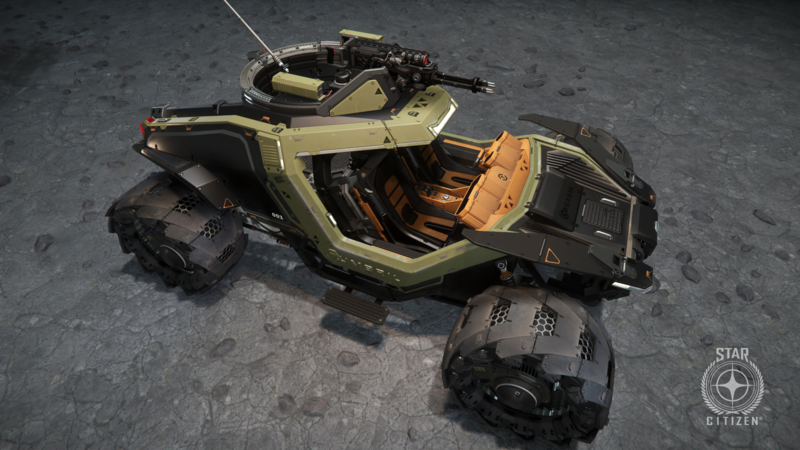Aelon
A species of humanoid aliens with the same lifespan-approximately-as your average human, the Aelon are tall, around six feet, lithe creatures with skin of many different shades, three eyes, the third of which is located directly at the center of their forehead, two internal auditory organs on either side of their head, near where the temples of a normal human would be, a slit like mouth with rows of teeth designed for tearing through flesh despite their recent switch to a more omnivorous diet, two nasal passages located at the center of their faces, and varying degrees of psionic power who evolved from a species of quadruped amphibians that once ruled the lands and seas of Iuris.
In regards to clothing Aelon generally wear attire that is wholly organic in appearance. Even their ships and buildings look the same way despite the fact none of them are actually alive, sapient, or sentient.
Achanastari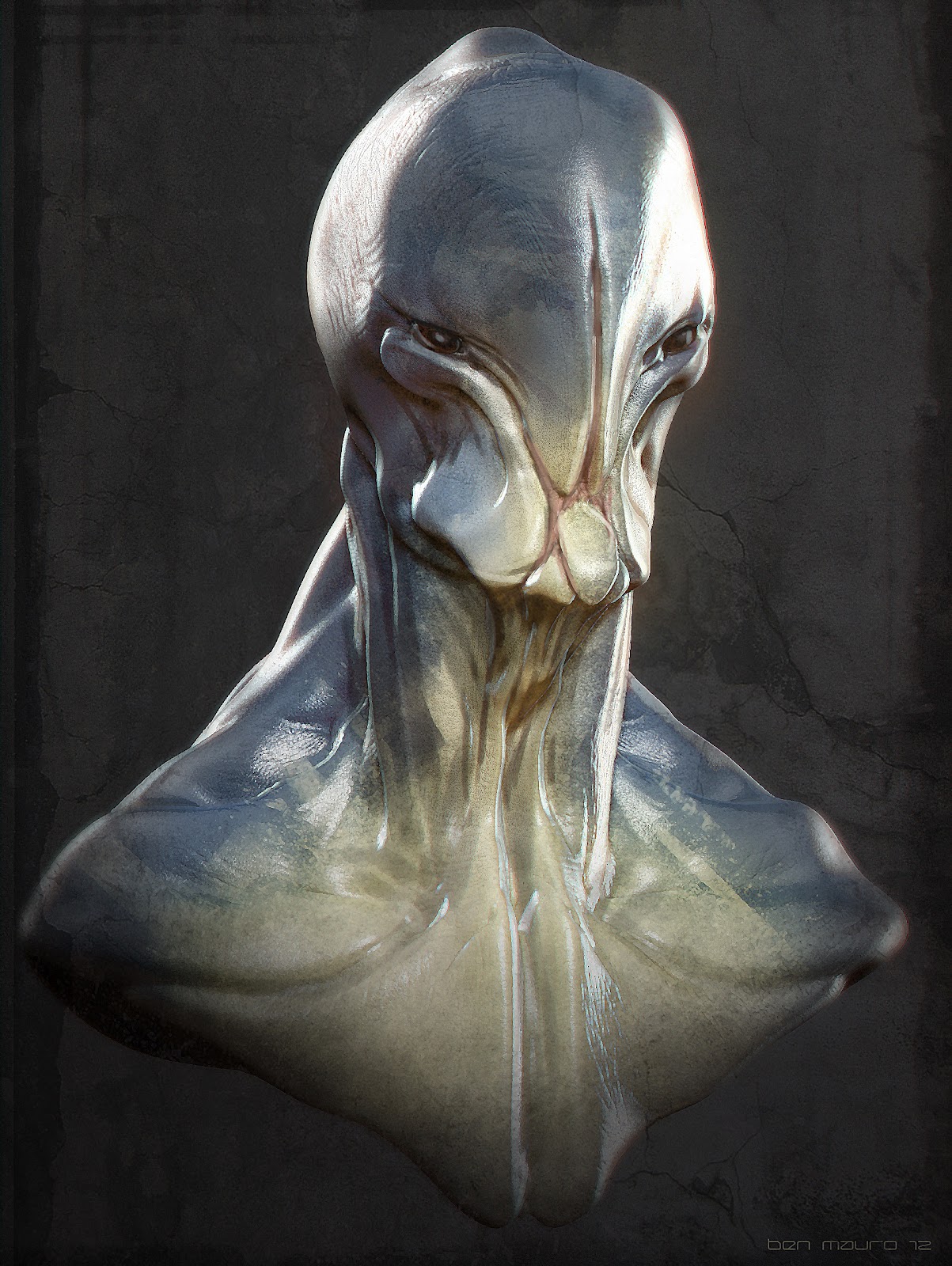
The indigenous population of the planet Furymilvyaz-2i, the Achanastari had already achieved limited spaceflight by the time of the arrival of the Volyudki in their system and had begun the process of explorative landings upon the other planets within their system, hoping to establish colonies upon them. This was interrupted by the Volyudki, who imposed their presence upon the system with little negotiation, subjecting the uninhabitable planets to aggressive mining operations and beginning the construction of more of the vast housing and manufacturing sectors that defined their burgeoning empire.
The Achanastari, left with little in the way of meaningful resistance, were entirely subsumed into the apparatus of their new overlords, a cultural affinity for bureaucracy ensuring them a solid, well defined role within the society of the Federation. Despite the harsh, violent change to their way of life they have adapted shockingly well, pioneering many of the adaptations of Volyudki cybernetic enhancement to their own biology and to that of unmodified humans. Culturally strongly individualist and solitary beings, they often clash with the more communally minded Volyudki, leading to occasional small scale violence and frequent workplace friction.
Ataraxin
Of all the tragedies to play out in the Eden luster, perhaps there is none greater than that of the Ataraxian species. A people who have lost their culture, history, their very being, the Ataraxians exist today as little more than the favoured vassals of their Human masters. Casualties of a migration they could not have predicted.
Of course, it was not always so. Centuries ago, on the world known today as Ataraxia, there were a proud, if young, people. The ancestors of today’s Ataraxian’s, native sons and daughters of a planet whose true name is now long forgotten. They were a unique and alien people in the midst of a prosperous iron age, rapidly spreading out across the surface of their world and beginning the inexorable conquest of nature that all sapient beings embark upon.
They were every bit the captains of their own destiny. They fought, they loved, but they did all this themselves. Not one of them could have expected that to change, but change it did. When the Halcyon Continuance sent a Gate to their world, two centuries before it arrived, they hadn’t even discovered the secrets of Iron. How could they have even begun to suspect that their children's children would live to see all their accomplishments turn to dust?
For that is what happened. As soon as that first connection was made all was lost. Halcyon sent diplomats to every kingdom and tribe on Ataraxia, but they were not sent to secure peace. They were sent to secure surrender. Few complied, but they didn’t need compliance. Merely an excuse. Forty eight hours after the first human stepped onto Ataraxia half a million Ataraxian’s were dead and the rest second class citizens of an alien power.
Though, perhaps that is too generous a description. Humans flooded onto Ataraxia until its native people were a minority on their own planet, and that was only the beginning. Soon it became illegal for Ataraxian’s to own property, illegal for Ataraxian’s to work in administrative positions, and it wasn’t like they had ever been permitted to vote.
For over a century the Ataraxian species suffered under the Human boot, and then came the offer. The Halcyon Continuance had been effectively overthrown by the corporate dynasties it had elevated to nobility, and one of those dynasties had a plan for the Ataraxian species. Ricci Biotechnical developed a genetic treatment that could, if taken for a few generations, alter the Ataraxian people to look, think, and behave more like their Human masters. It was, in effect, genocide in a bottle. Of course, that mattered little when committing to the treatment guaranteed an Ataraxian full rights for their children, so long as they too stayed on it.
The price was high, in the beginning, but soon Ricci Biotechnical was able to sell the treatment for pennies. After all, they had just recently been awarded nearly a quarter of Ataraxia as their fief. They had no reason not to ‘improve’ its populace. At least, no reason its noble board controllers could see.
Centuries later and now every living Ataraxian looks close to Human, acts close to Human, and speaks exactly like a Human would. Interbreeding is still impossible, with many of the changes to Ataraxian physiology being more cosmetic than functional, but by and large the modern Ataraxian is little different than a Human. While the Continuance still forbids Aliens from holding noble titles there are few Ataraxian’s that don’t at least hold the status of a Commoner, a class with all the rights of a citizen and the ability to settle on Halcyon itself.
They are often seen in noble houses as servants or soldiers.
Anteans
The Antean race was born of the life that evolved among the savannah and grasslands of Ankhan, being similar to ants in terms of their biology and function. Standing bipedal on two legs, having four arms, an ant-style butt, having advanced bug-like yet pupiless eyes, a human-style mouth and head/torso, some mammal-like hair on their heads, and covered in tough insect-like chitin plates, the Anteans are among the more “alien” sentient species of their home planet. In primitive times the race was best known for the great earthen mounds and complex underground labyrinths their settlements formed, and before even achieving sentience they operated akin to a singular “super-organism”. Admittedly, however, they were also the slowest among Ankhan’s races to advance technologically as time went on. Though the eventual uplifting of the race technologically, achieved in full by current times, was a very big and notable event for their species as a whole.
Anteans are a race tend to follow a very insect-like pattern when individuals are born, a trait hailing way back to their animalistic ancient past that has long since faded, with most members of the race being born with certain features and aspects at birth. Most members of the species are wingless female workers and the larger soldiers (some of which can be born specialized in some manner biologically), who can breed but only have 1-3 children at most. This is followed by a very small proportion of the population being male Anteans, who are the only other variant of Antean to have wings…but are also no larger than the average worker Antean at most. Then most rare are the “queens” of the race, female Anteans born with wings, being highly fertile, a stronger carapace, and with the capacity to carry and birth many Anteans at a given time.
Broxa
The natives of the world of Ascalon, they were initially hostile to humans and had meso-american technological levels, but were completely crushed. With no other choice, they have begun integrating in human society.
Cala
A race of humanoids that resembled anthropomorphic cats. A race on the edge of the extinction when allowed to join the UIC. A former primitive tribal civilization. while a new nation within the UIC they tend to keep to themselves but they can be found within every position with society. They view the races of the UIC as gods and have vowed to serve them even though the UIC has done their best to change that belief.
Dathu
An Amphibious species with mammalian traits. The Dathu are an antiquated people with a similar culture to the middle ages of Old Earth. Their world ruled by nobles, lords and kings. Upon joining the federation, the reign of the ruling class still persists, if now more “evolved”, many of the noble houses becoming heads of stellar spanning corporations within the federation.
Gubby
Gubbies are tiny cephalopods with humanoid heads, growing only to be around fifty centimetres long. They hail from the undersea cities of Tang 4 (also known as Urpie), where they’ve lived for aeons without disturbance. However, when their planet was discovered to possess insane amounts of thorium, Raygon corporations soon began to swarm around.
It turned out that the Gubbies were not the peaceful squids the planetary surveys suggested, but where instead highly skilled weapons developers. While their underground production facilities were less than stellar in comparison to Raygon industry, the pulverised ships in Urpie’s orbit could not dispute their firepower. Gubbies were immediately contacted with peaceful and cooperative intent and are today the minds behind top-tier companies such as Helios Arms Inc. and CruiserCorp. Gubbies make up a total of 3% of the total population and typically move around in suits when not on their home planet, as they are extremely sensitive to other environments.
Human Hoffian
Hoffian Jakai
Jakai
The Jakai are repto-avians that culturally and technologically weren't too similar from the late 21st century humans, and when discovered, were within the cusp of their own golden space age. Unlike the Dathu, the Jakai were more progressive-minded, and more open to the federation's ideals of democracy and liberty.
Krunt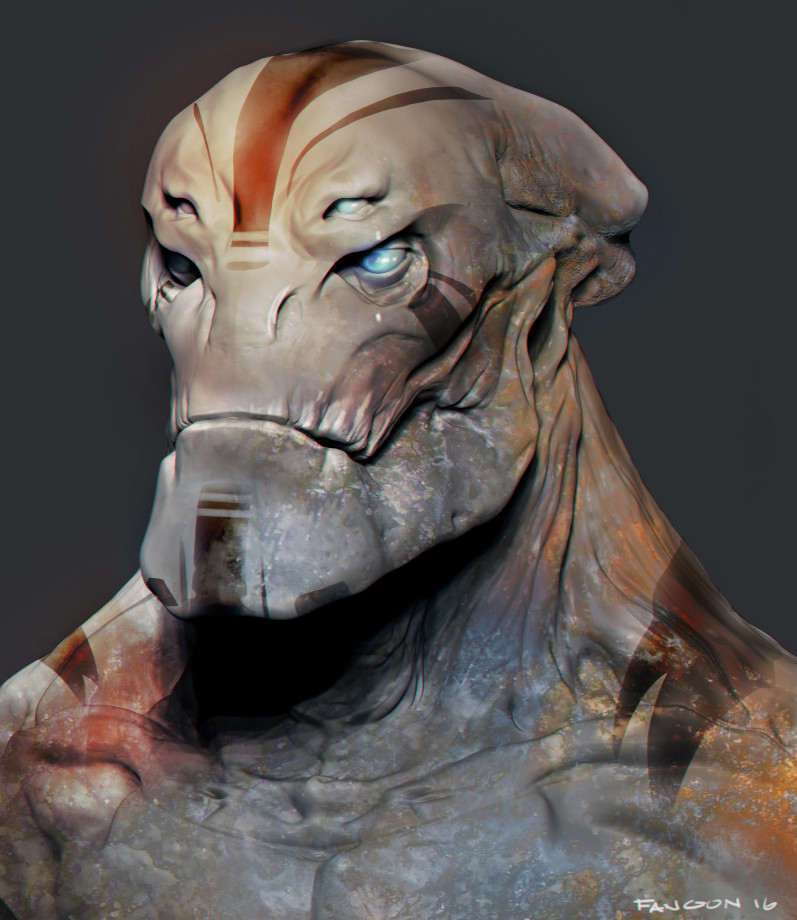
These native pre-industiral lifeforms are large humanoid sentient creatures that can easily tear a human in half. often one of various shades of brown. Off of first appearance one would assume they are aggressive killing machines that know little other then that, as they tend to care little for most lesser beings. Their culture is more refined than one would presume, consisting of vibrant art, poetry, philosophy, Literature that is very insightful and shows a very intellectual and wise mind set held by the majority of the population. Found as the planet T-234, now dubbed New liberty, the Krunt were found to be the native population. As first contact began a small colony was allowed to be constructed in the southern hemisphere of the planet. After years of coexistence, the Krunt finally petitioned for entry into the union. The Newly inducted Krunt fill the roles of soldiers and construction and Laborers. they are well renowned for their rolls as shock troopers in the military and as bodyguards to VIPs.
Ka’thir
The Ka’thir race are also a prime example of “convergent evolution” and “parallel evolution” creating a similar product to a “human being” way out there in the universe. In this case, however, their features differ very much from humanity as well in ways. These alien traits include a pair of jackal-like ears on their heads that have incredible hearing ability at a distance, a universal black hair color for members of their race, a fluffy black-furred tail, and slitted animal-like eyes that can see easily even in the dark and range in color from gold to silver to ruby and emerald and similar gem-like colors. Further, females of the Ka’thir go into a serious and full-on “heat” when aroused enough, and males of the species (instead of that) have a far more hyper-sensitive sense of smell when it comes to hormones and pheromones as compared to females. In fact, the sense of smell for male Ka’thir is so great they can detect animals and identify the sex of individuals with precision at a distance...at least based on the hormones and/or pheromones the target produces.
Strangely, and attributed to a possible common ancestor or mutation of genetics very far back, Ka’thir and Valkyrians can breed with each other. Due to the Valkyrian genome being strong these children are often female Valkyrians, or otherwise are half-Valkyrian half-Ka’thir females whose children end up being only one race or the other depending on their “mate”.
Krentasian
The Krentasian’s are, on average, approximately 3 meters (~ 10 feet) tall, with smooth, Green-coloured skin, almost hypnotically golden eyes, and long, sweeping tails. Their bodies are more Muscular than humans. Their skin is surprisingly smooth, iridescent, and Green in colour with Krentan (Male) being darker than the Krentas (female). Their bodies have Draconic-like features such as long sweeping tails, pointed ears and triangular faces with flat bifurcated noses. The skeletal structure is reinforced with naturally occurring carbon fibre, they have roughly four times the strength of the average human.
The average Krentasian life span is longer than that of a human, approximately 30% longer, though they mature more rapidly while an average Krentan is approximately 3 meters (10 feet) tall; Krentas slightly less, average 2.5 meters (8 feet) tall, a Krentan has a mass around 210 kg (approximately 463 pounds), a Krentas mass slightly less, around 190 kg (419 pounds) due to lighter build and slightly shorter stature. While the males of the species emanated an aura of bulk and strength, the females have a distinctive air of grace, elegance and agility about them. Both genders of the species have fairly thick and long tails while the ones on the Krentas are thinner, their tails can be moved and controlled like any other appendage and is used primarily for balance, it can also be used to express emotion.
Krentasian’s have hair on their heads, but appear to have no other body hair, with the exception of eyelashes, eyebrows, the tips of their ears and a small "bob" of fur on the end of their tails. The reproduction mechanics are similar to humans and other. However, it should be noted that although Krentas have breasts similar to those on female humans, also used to nurse their infants, they are not placental mammals and, as such, the actual internal reproductive biology is quite different from humanity. Dentition is similar to that of humans, though the canines are more pronounced, this is because they are an omnivorous species. They eat meat as demonstrated by their hunting practices and pronounced canines but have also been seen to forage, demonstrating their consumption of plants and other produce.
Despite their green skin colour, the Krentasian’s have red blood, they also have very strong immune systems and thus Immune to many diseases and biological attacks, But not all. However, they can act as carriers where other races may be susceptible to infection. Members of species have shown to exhibit psychic abilities.
Misle
When humanity first encountered the Misle, it was believed that the Misle were a subspecies of humanity, perhaps descendants of an ark who somehow arrived centuries or millennium before the other arks and somehow had a rapid bout of evolution and adaptation. This theory was quickly debunked; despite easily being described as humans with red colored hair and white or silver hair the Misle are a completely different species. Males and females of the species look almost identical, the most easily seen difference between the two being the male’s lack of enlarged breasts. Their feudal civilization collapsed upon meeting humanity. Cultural shock, the collapse of their frail economies, and human-borne disease decimated the Misle population. Only recently have the Misle begun to recover, yet they have even begun to thrive within the last decade. Misle are the only xeno species to immigrate to the FSC’s capital world in any meaningful number and have found a lot of work in the fine arts as painters, actors, and entertainers of all kinds.
Midgarian
The Midgarians are a humanoid simultaneous hermaphrodite species, they have an endoskeleton, lips, teeth which is similar to that of humans. They have two luminescent eyes with glowing irises, eyelids and tear ducts; this means the eyesight of a Midgarian is pretty standard during the daylight, they are able to see normally during extreme darkness or night. This 'night vision' does come at a cost, however, their focus on distant objects can be slower than that of a normal human as their pupils do not dilate. they also have five fingers, one of which is a thumb along with five toes on each foot, The Species reach approximately 5'6 to 5'10 on average and weighting 158 to 170lbs on average.
In appearance, however, the Midgarians are distinctly feminine, at least to other humanoid races. They have a slender feminine build with slight muscular tones and curves, their skin colour is usually purple, blue or pale grey which is of a smooth leathery texture. Generally, Midgarians reach maturity around the age of 22 years old with a lifespan approximately 300 years, Midgarian facial structure and hair actually makes them close to humans in physical appearance, if you can look past their feathery ears and gloving eyes that is. Their physical strength is similar to humans within their own natural gravity of their home world, however; Arinar's gravitational pull is many times greater than the planetary average., a Midgarian possess elevated strength and resilience in environments with an Earth-like or similar gravity, with some often joking they have super-strength.
Midgarian's have a complex endocrine system, having several more hormones and chemicals than humans. Although internally, Midgarian's have less glands than the human endocrine system, The Midgarian system produces a greater variety of hormones for each gland present. The most notable of these hormones is the calming chemical known as Relaxitin, which is released from the Midgarian equivalent of the adrenal glands when severely stressed. Relaxitin attaches to the areas of the brain that produces stress, causing the cells to calm and release dopamine, creating an effect similar to the effect of THC in humans.
Unlike most other organisms, The Midgarian's have a specialized desalination gland, located about 3 centimetres from the mouth, allowing them to drink both salt water and freshwater. When salt water is ingested, the gland produces several enzymes that remove the salt from the water. The removed salt molecules are then transported by the blood to the skin, where it is then released from the body, much like sweating in humans. While the species has a robust cellular regenerative system, they do not heal faster than other species. Midgarian blood also differs from most other species as it is a blueish purple colour, this is due to the trace amount of Cobalt in their blood instead of Iron.
As a simultaneous hermaphrodite species, as each individual possess both male and female reproductive organs with the latter being a similar internal reproductive biology to a female human. As a result, there are no gender differences, or gender-based issues which could be common to other cultures. Each individual has a smooth scalar prehensile tail hidden away in their body’s lower back, which acts as the male reproductive organ at the tip. This tail on average is about a meter long, sometimes longer. At will, though usually easier when sexually aroused, they may “grow” the tail out of their body but they prefer not to. Although it may seem that a Midgarian may reproduce without a mate having both a male and female reproductive organs, in reality it doesn't work as they have a protective mechanism against self-fertilization.
Nerkin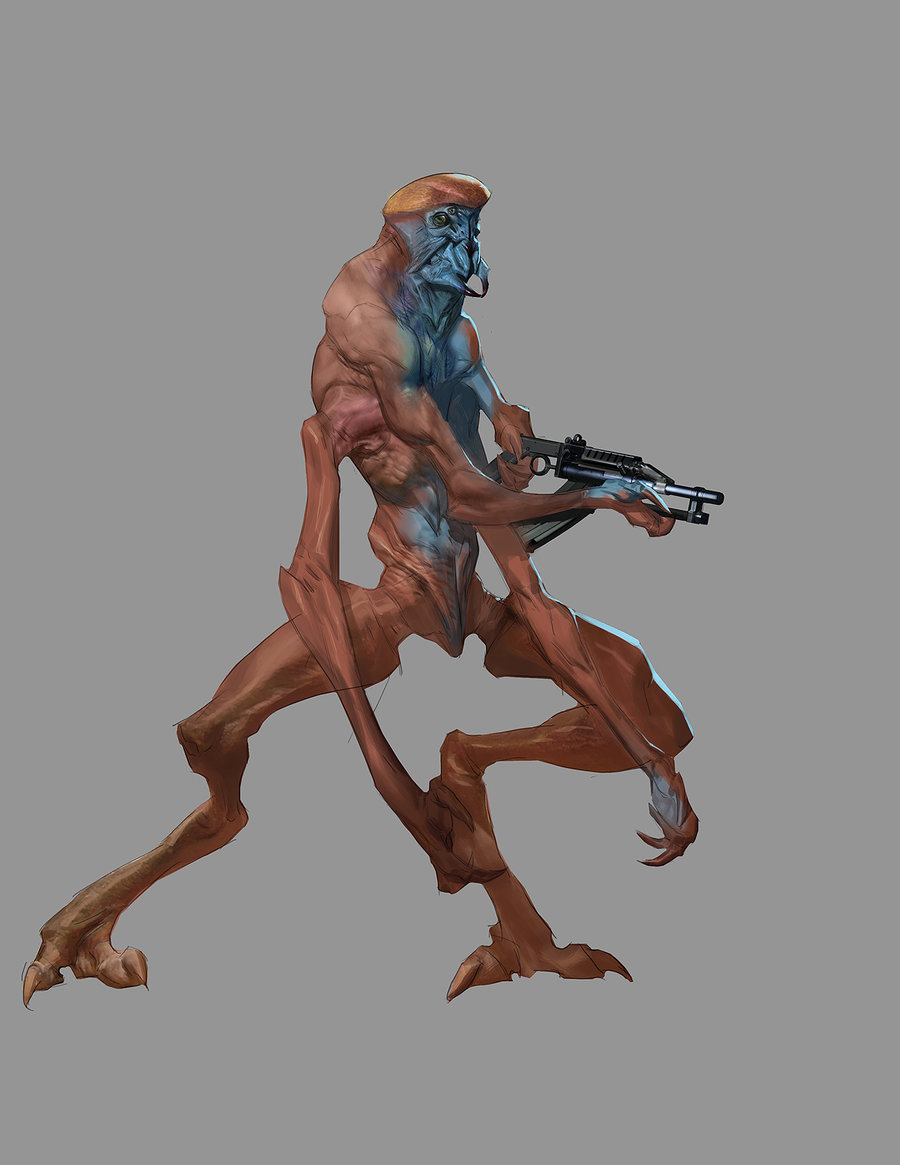
Perhaps the only species more able to adapt to new worlds than humanity, at least within the borders of the FSC, Nerkin can be found on almost every inhabitable world within the FSC. Once a relatively advanced species, their civilization had collapsed several centuries before the appearance of humanity in the region. They are well known for being an aggressive and savage species, although it is unclear if this is due to their rather bad relations with humanity or simply their natural temperament. They earned the nickname of Roaches from FSC traders and settlers after it was realized that they were somehow stowing away in FSC ships and settling new colonies alongside human ones.
Nalloth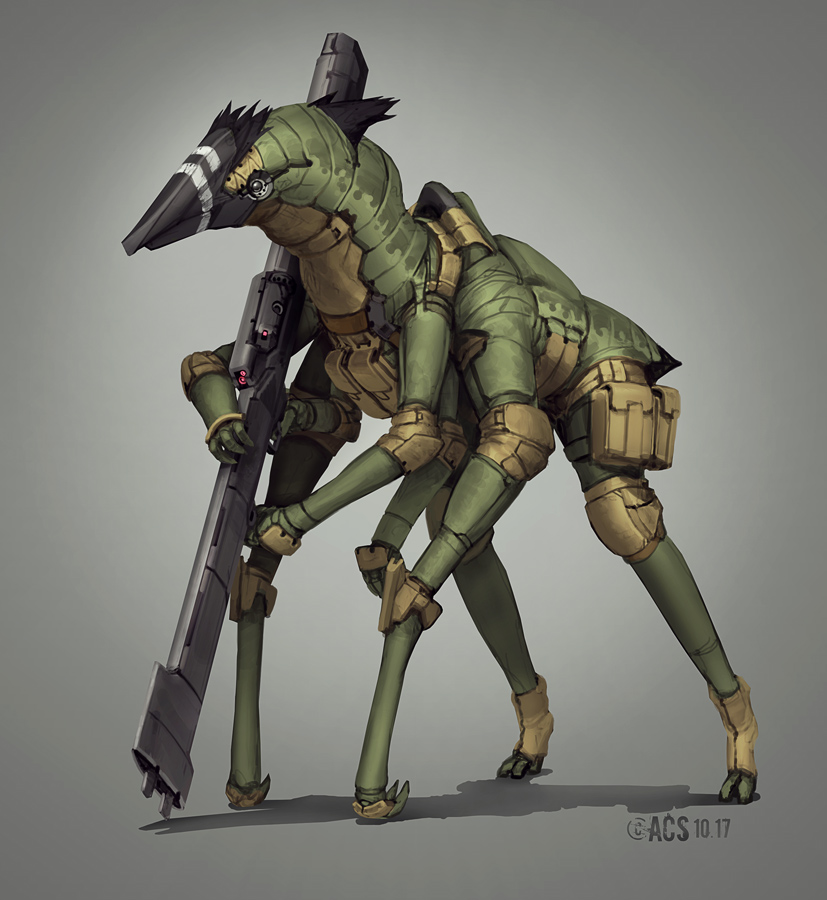
Nalloth: An interesting species possessing many of the traits of mammals, Nalloth civilization was largely tribal when humanity first colonized their homeworld. They have generally had a live and let live relationship with the humans that have colonized their homeworld, although the few that have chosen to move closer to human settles are widely sought after due to their ability to easily adapt to zero-g conditions. Despite this many Nalloth have had difficult acclimating to human civilization and end up joining human raiding civilization.
Neohuman
To explain, Neohuman is the term used by people in the Sol system to describe themselves and similar beings. The descendants of the humans to first arrive there have modified themselves with cybernetics and genetic editing to the point they can no longer procreate with humans from outside of their territory. The full list of their modifications can go on for very long: functional immortality given maintenance, imperviousness to radiation, the elements, poisons and disease. Strength, endurance and physical durability, larger frames, and drastically improved intelligence. All sorts new functionalities are added from new spectra of colour being determinate, to communications equipment built in, to first aid and self-repair kits, to solar and other energy absorbents, to all sorts of work equipment beneath the skin. If needed, any neohuman can self-destruct to go out in a small but powerful blaze of super-heated fats with power cells throwing shards of bone and electronics as horrifying shrapnel as though from a shaped charge. A Neohuman’s cranial implants allow them to download and store knowledge for any job be it diplomat and soldier. However, one’s aptitudes will provide a specific job and further augments particular to a neohuman’s profession will be provided be it voice synthesizers, pheromone vents and internal translators for the former or retractable blades, lasers and internal shield generators for the latter. To finalize, no two Neohumans will be the same. Though there is an attempt to create functional parity between people, two people might have the same augmented strength in their legs but one achieving it with gene editing and muscle grafts, the other through cybernetics. For some people many augments are a drain on their power supplies and will thus not be taken if not needed. Many people of the CCN will look like ordinary people, simple larger, more muscular, aesthetically pleasing — perfect. But just as many will be visibly inhuman creatures, their skin cold metal and plastics, their eyes artificial lenses oft glowing from within. But starting from the moment of insemination a Neohuman child will be very far ahead of his or her ancestors.
Nyreeni
The Nyreeni are a race native to the Nyrene system, particularly the world of Nyrene Terius. They are all very low - save for a few exceptional individuals at the higher - level psychics giving them attunement to each other and their home planet. They are largely similar to humans in physiognomy, the biggest visual distinction being quasi tentacles on the head (useful largely as sensory organs) and a colourful assortment of skin colours. The diaspora of them was very, very small given they had an almost physical need to be on their home planet as well as with each other and with Neohuman forces wiping them out of Nyrene their total population in all Eden is less than a billion.
Putt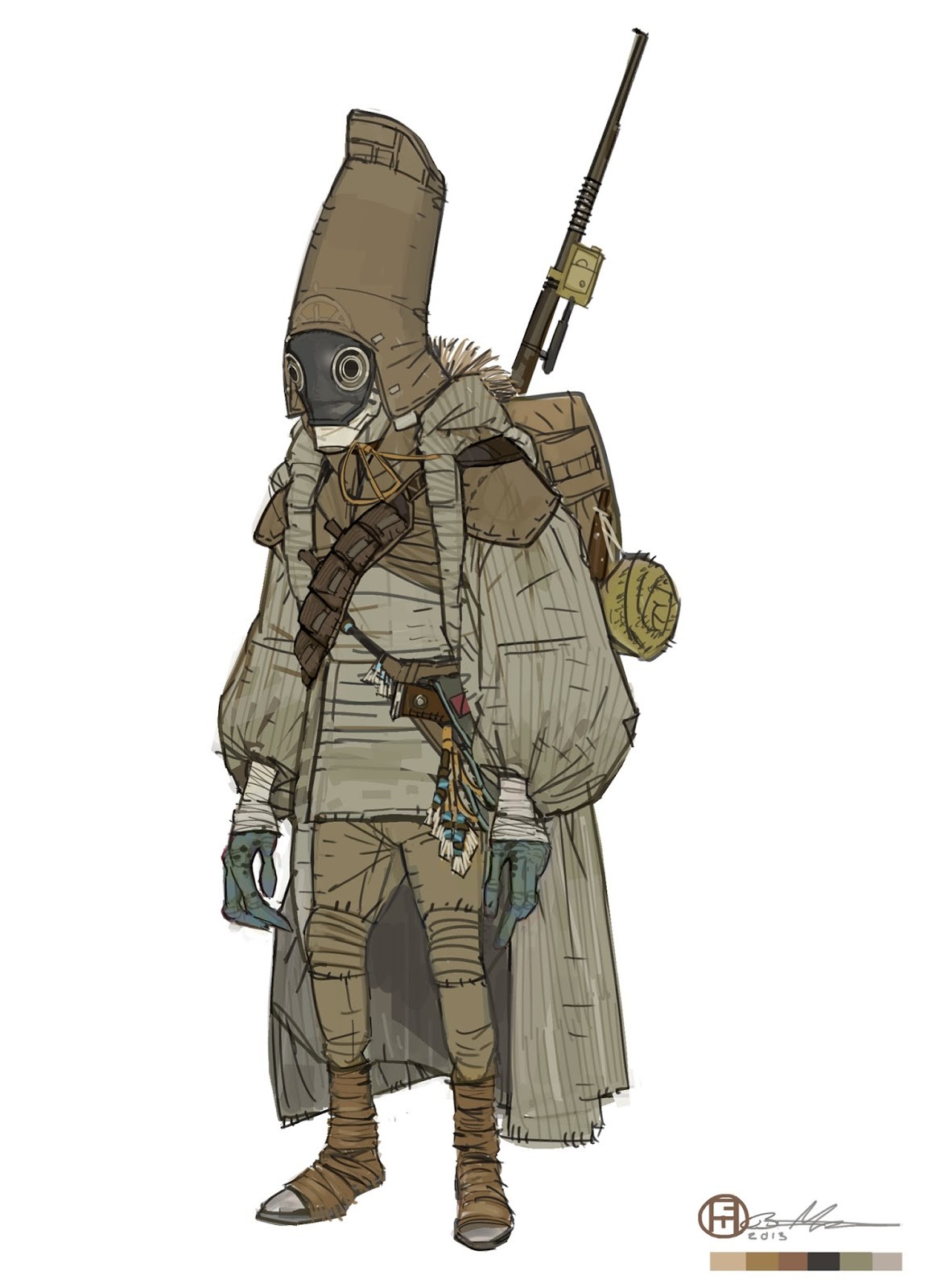
Putts come from the fringe desert planet of Demos 4, also known as Oppo. They’re slightly shorter than human males on average, standing on average 167 centimetres for both males and females, sly and business-savvy, hailing from a tiny desert planet where competition, exploitation and opportunism means survival. They are skinny and fragile, however, and make for poor soldiers. No, their speciality comes in the business of trade, them being among the finest salespeople around. It is said that a Putt could sell human food to a petalos. Putts are surprisingly at ease with the Raygon atmosphere, and frequently move around in the streets without protection gear.
Petalos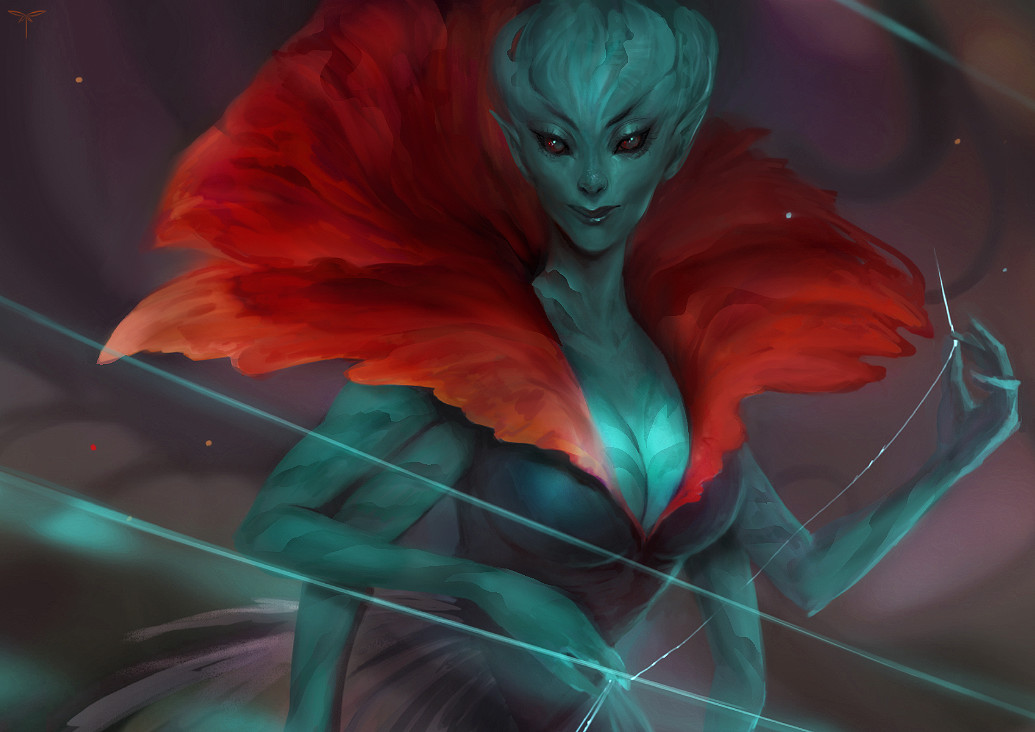
Humanoid plantoids evolved from a special species of flower from the planet of Aether, located in the Sage system. The planet also goes by the name Sage 3. Petalosi are on average 2 metres tall, both for males and females, and typically come in colours from green to dark blue to purple to red. Their skin has a leaf-like coarseness to it, and while they are described as humanoid, they can grow up to two additional sets of arms and legs in addition to the pairs they are grown with. Petalosi are dependent on three sources of sustenance to survive: Sunlight, water and earth. Unfortunately, what little earth remains on Raygon 8 has long since been polluted to lethal levels, so their food is usually imported from Aether. The atmosphere on Raygon 8 is also incredibly dense at times, making it hard to get sufficient sunlight. As such, Petalos homes come equipped with solarium lamps.
The Petalosi have a natural sense of ingenuity and innovation, fascinated with everything and anything that grows, whether that be plants, lab experiments or numbers on a financial graph. This has made them among the most demanded in the national workforce, taking jobs such as inventors, scientists, engineers, economists and stock brokers. As such, one rarely ever sees a poor Petalos. In many circles, they are the very symbol of success and wealth, and can occasionally suffer hate for it.
Qurok
Quroks are enormous humanoids hailing from the outer sector, specifically from Ripp. They have thick, leathery skin in the shade of meaty pink, earlike shapes growing out of their skulls made of bone, and have keen senses of smell. They stand on average 2,3 metres tall for both males and females. Ripp is a savage system, and Ripp 3 is a gruesome place to evolve, being a hellish landscape of toxic swamps, massive predators and an acidic atmosphere. Quroks originally evolved underground, where they formed colonies that would hunt on the surface. They developed enormous lung capacity, a natural resistance to toxic gases, and the ability to seal shut every orifice in their body and protect their eyes with thick layers of biological glass - if not for the cold of space, they would be able to survive by just holding their breath. Once Raygon emissaries reached them and introduced them to technology, the Quroks have taken up work on industrial worlds and space stations, requiring very little oxygen to actually sustain themselves. Given that they only were discovered a little under a century ago, many of their tricks from hunting still remain, and many Quroks take up work as mercenaries and bounty hunters. Quroks make up roughly 9% of the population and are scattered throughout all three sectors.
Raygonian
Raygonians are dense in most senses of the word, being stocky, powerfully built and incredibly tough, standing on average 181 centimetres tall for males and 186 for females. Their skin is leathery and at times scaley, their eyes beady, and their mugs mean. However, their minds very bright, especially when it comes to trade, geometry, industry and construction. Raygonians were already far into the space age by the time the first humans arrived, and really, it would be odd if they weren’t. Raygon used to be a resource rich beacon of life, making it perfect for natural industrialists. Raygonians have changed much in the last 700 years, having been forced to genetically alter themselves to adjust to the changing atmosphere of their planet, which by now is near toxic in areas. They are naturally communal, having lived in enormous, hive-like societies for aeons. This comes in handy on Raygon, where the population density is roughly 1 000 000 per square kilometre. Raygonians make up 27% of the nation’s population, existing almost entirely on Raygon.
Shas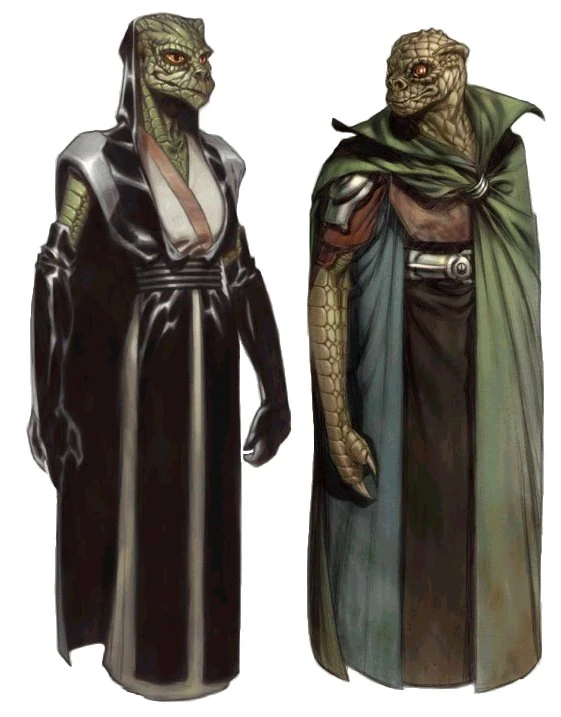
A Reptilian native population. Like humans these humanoid nomads lacked any significant natural advantage.
Simmie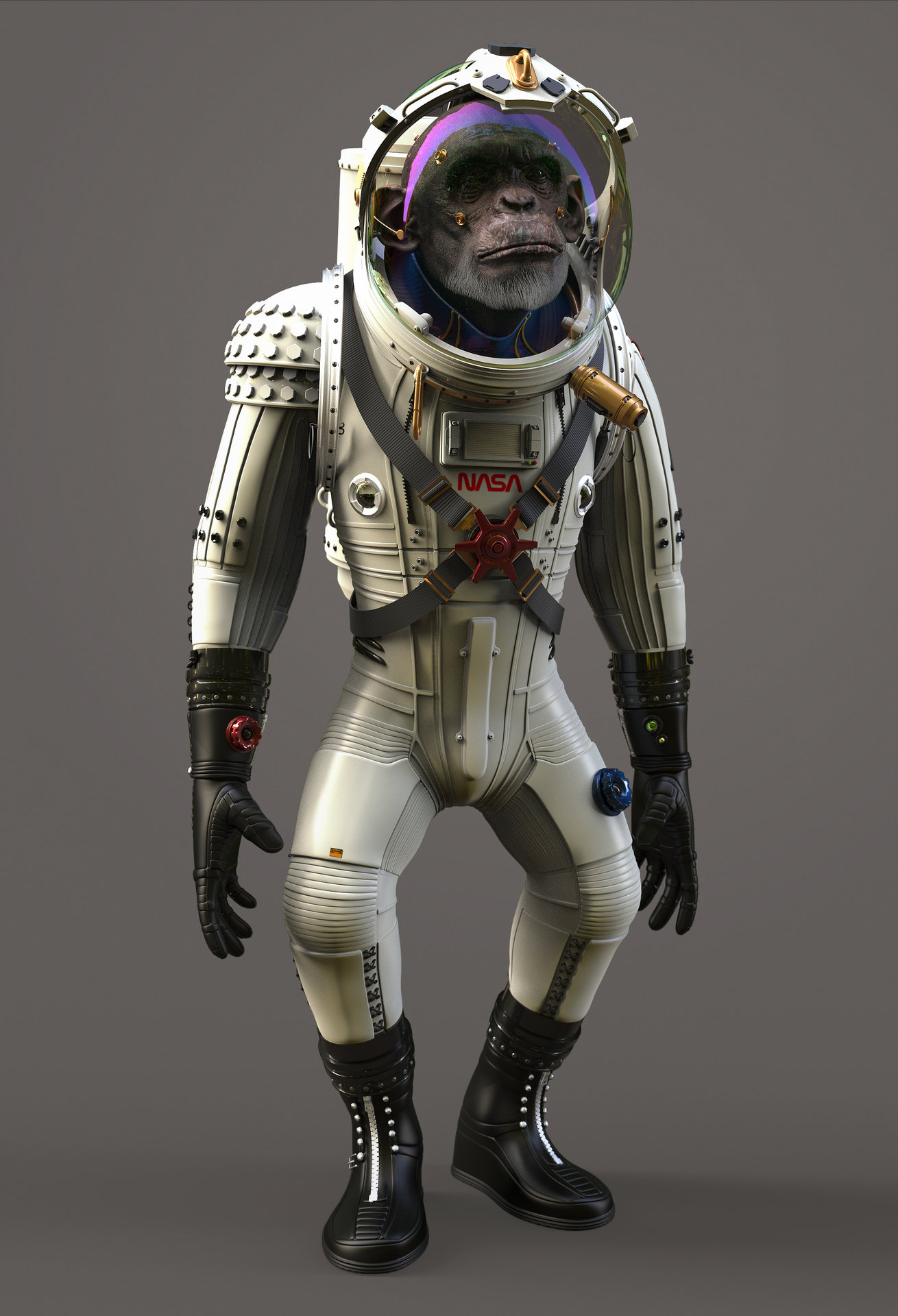
The Simmies would be quite familiar to humans, seeing as they actually came with them. They are great apes (including chimpanzees, bonobos, gorillas and orangutans) brought along by humanity for experimentation. Eventually exposed to a brain-altering serum, the apes developed an almost human-like self-conscious and understanding. While they are only 200 years old as a new subgroup of great apes, they possess an almost eerie level of civility, having adopted a great deal of cultural norms from humanity. They still separate themselves in a number of ways, particularly by means of language, which they convey through hand signs and grunts. Simmies commonly work as mechanics, electricians, drone operators and construction workers on account of their agility and dexterity, or as translators when Mi-self Translate is down. Their numbers are few, only making up 2% of the population, and they are concentrated on Raygon.
Sautraken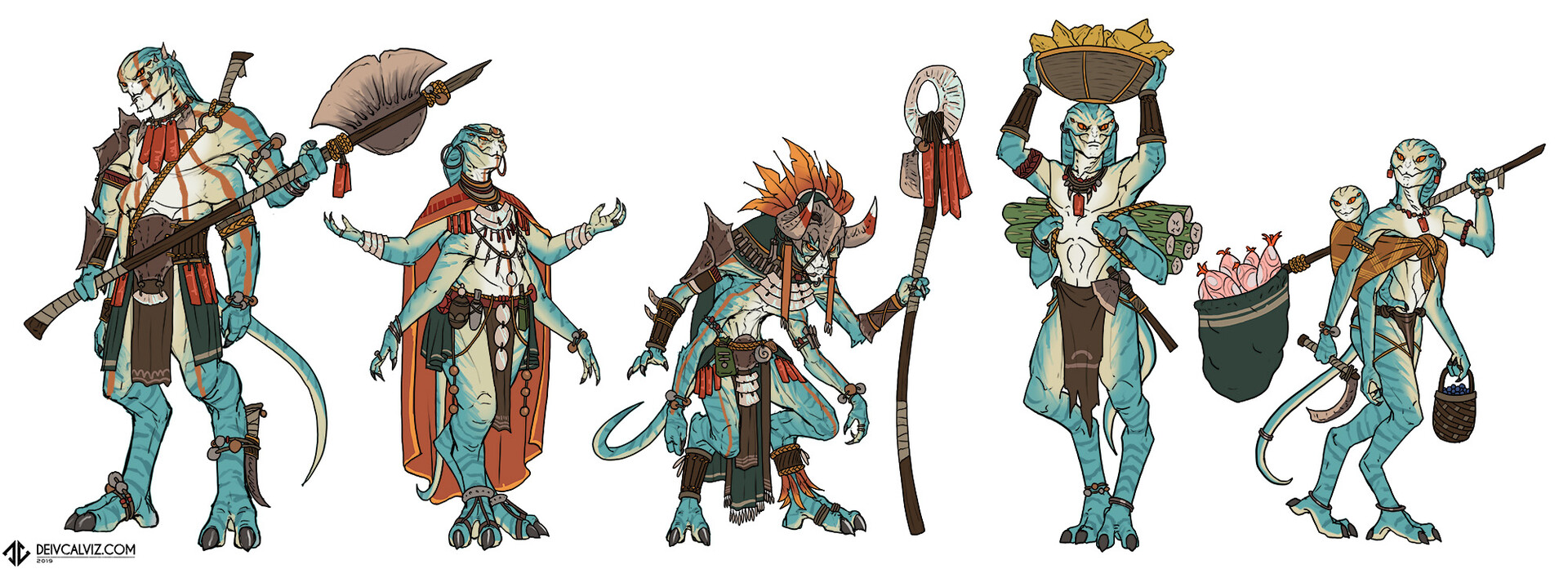 Ulex
Ulex Volyudki
Volyudki
An offshoot of humanity tracing their origins back to the early days after the detection of the rogue star known as Perses. In the vast, uncontrolled violence and pandemonium that ensued, one nation created the progenitors of the people that would come to call themselves Volyudki. Initially an attempted supersoldier project, they have come far since then through liberal use of genetic modification technology, sporting an engineered compatibility with cybernetic modification. The average Volyudki stands at 193cm and 136kg, not including the extensive cybernetic modifications made to most individuals throughout their lifetimes. The Volyudki posess an unmodified average lifespan similar to that of healthy humans, and a modified lifespan that can seemingly stretch on for hundreds of years. In addition to the physical modifications done to themselves, signwprefab housingificant modifications have been made to other aspects of their biology, such as their male to female sex ratio - currently sitting at 1:20.
Valkyrian
Valkyrians appear rather similar to the humans of earth in many ways, though themselves are an entirely different species that evolved on a very much alien world. They possess a range of black and brown and even grey/silver colored hair, trademark pale white skin ( they don’t burn in the sun though), and crimson colored eyes that are a universal trait of their race. Likewise females stand 6-7 feet tall very normally and are able to “breed amongst themselves” naturally, whereas the males of the species are 4-5 feet tall very normally and are naturally infertile due to possessing their race’s equivalent of a Y chromosome. This is because the Valkyrian Y chromosome is itself actually a damaged X chromosome that resulted in an “incomplete phenotype” being expressed for the titular males of the species.
The Valkyrians are themselves also a prime example of “convergent evolution” and “parallel evolution” creating a similar product to a “human being” way out there in the universe.
Valkyrians appear rather similar to the humans of earth in many ways, though themselves are an entirely different species that evolved on a very much alien world. They possess a range of black and brown and even grey/silver colored hair, trademark pale white skin ( they don’t burn in the sun though), and crimson colored eyes that are a universal trait of their race. Likewise females stand 6-7 feet tall very normally and are able to “breed amongst themselves” naturally, whereas the males of the species are 4-5 feet tall very normally and are naturally infertile due to possessing their race’s equivalent of a Y chromosome. This is because the Valkyrian Y chromosome is itself actually a damaged X chromosome that resulted in an “incomplete phenotype” being expressed for the titular males of the species.
The Valkyrians are themselves also a prime example of “convergent evolution” and “parallel evolution” creating a similar product to a “human being” way out there in the universe.
Yog'sloth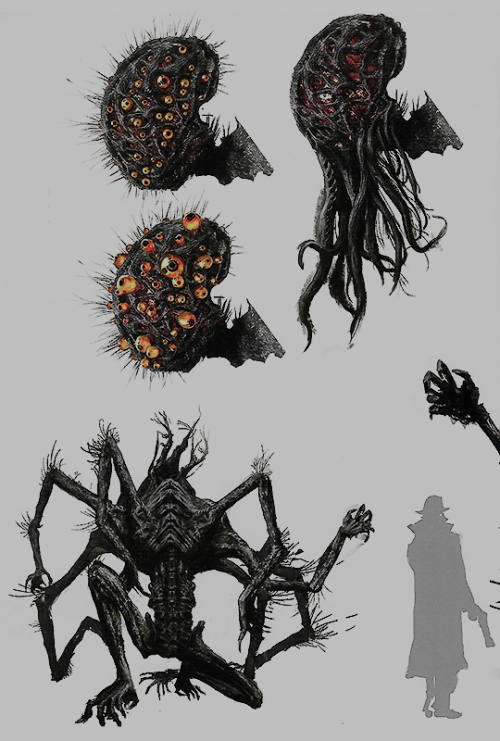
Spider-like in shape and biology, With a short tail and a head with many bulbous eyes and six-fingered hands on seven arms. They have reptilian talons on their two legs and are capable of complex thought and are very friendly in stark contrast to their hideous appearance. Skilled at engineering, multi tasking and are herbivorous. They are very long lived and don't reproduce often, mainly in part due to their long lives. They don't seem to care for much other then tinkering with machines and learning about the new galactic community.






























